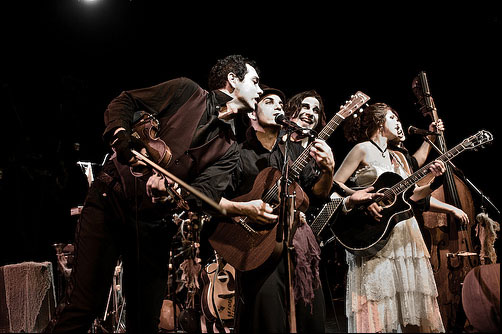Meteor Shower, or Comedy Is Hard
Everyone old enough to have seen more than a couple of Steve Martin's movies or routines has a favorite joke of his. Mine are his line about being flabbergasted upon visiting France (“they have a different word for everything over there!”) and a line from L.A. Story, for which Martin wrote the script, that the lucky bastard Patrick Stewart gets to say as a beyond-snotty maître d’ at the ultra-exclusive restaurant L’Idiot, who thinks some of his clientele aren’t successful enough to order some of the items on the menu (“Ze duck? You can’t have ze duck. You can have ze chicken!”).
As Martin has moved further into writing, he has found a place as a playwright, and something of a champion in the Long Wharf Theater, which has produced The Underpants, which I didn’t see, and Picasso at the Lapin Agile, which I did see and thought was pretty funny.
So what happened with Meteor Shower?
To be fair, plenty of people thought Meteor Shower is also pretty funny. The night my wife and I went, half of the audience laughed at almost all the jokes. But the other half didn’t, and my wife and I—who have pretty divergent tastes in humor—were among them. She was ready to leave after intermission. I convinced her to stay, and felt that the second half was stronger than the first. But still, I thought, what happened?
Meteor Shower tells the story of Norm (Patrick Breen) and Corky (Arden Myrin), a wife and husband who seem to be getting along through a mixture of genuine, though possibly waning, affection, as well as a series of routines they’ve picked up from therapy. Social climbers, they’re getting ready for a dinner party with acquaintances Gerald (Josh Stamberg) and Laura (Sophina Brown), though a casual comment Corky drops about having to deal with your subconscious or it will deal with you suggests that possibly the guests aren’t quite what they seems.
In any case, Gerald and Laura turn out to be scenery chewers of the highest order—she’s so sexy it hurts, wriggling out of her dress with every casual move she makes, and he’s just the kind of leather jacket-clad New Age bro that gives Southern California a bad name. The new couple comes on to the old couple in a way that wants to seem like hip 1990s—the play is set in 1993—but comes across more douchey 1970s. That this couple is staggeringly unlikeable is intentional, of course, and the rest of the play involves Norm and Corky in some sense getting to do the whole party over in a couple different ways, first to figure out what is going on, and finally to get the upper hand of their dinner guests, and dodge an earthbound meteor in the process.
As usual, Long Wharf’s production of Meteor Shower is great. All four actors fully inhabit their characters, diving into them with gusto and working to make every joke count. The set is beautiful to look at and cleverly constructed, and the special effects are flawlessly executed.
Sounds fun, right? But here’s the problem, in a nutshell: The play doesn’t make much sense. If—spoilers ahead—Gerald and Laura are actually a real couple, then they’re kind of unbelievable as human beings, even in a sex farce like Meteor Shower is. If they’re instead subconscious manifestations of Norm and Corky—which, fine—then the rest of the play falls apart at the seams. If Norm and Corky aren’t having guests over, who did they put the hors d’oeuvres out for? And how is it that the catalyst for our protagonists getting the better of their subconscious selves is a phone call from the outside world? Meteor Shower doesn’t pass a test that plenty of writers get right (The Sixth Sense, Fight Club, and, most recently, Mr. Robot come to mind): If you want audiences to realize late in the game that one or more of the characters aren’t there, or that things aren’t what they seem, then you have to make sure that your plot holds up when the deception is revealed, that an audience can reconstruct what really happened while it was being treated to the full monty of a character’s distorted vision of reality. Meteor Shower leaves us with very little to grab onto in the end.
And more important in a minute-by-minute way, the humor in Meteor Shower seems to try to draw its power mostly from being shocking—and at least from where I was sitting (in row C), I wasn’t shocked. I don’t think of myself as particularly worldly. My youth wasn’t that wild. I live in a house in the suburbs. And yet, while the woman next to me exploded with laughter at turn after turn, I wasn’t shocked into much more than a chuckle by the over-the-top come-ons, whether woman on woman, man on man, or man on vegetable dip. I felt some cheap schadenfreude at watching Norm and Corky conquer their guests, though I just giggled mildly at the even more over-the-top way they did it. And I left the play wondering what the play was really trying to say about much of anything, and got nothing.
Is it fair to ask a comedy to mean something? Can’t we just relax and have a good time? Well, sure. But I’d argue that the best comedies are a kind of philosophy in themselves. They offer ways of looking at life, of moving through the world, and of dealing with what’s thrown at you with humor and grace that are as deep to me as the most despairing tragedy. You laugh until you cry. You laugh until your stomach hurts. And you aren’t quite the same afterward. You’re better.
Martin is more than capable of producing that kind of comedy. I can’t wait to see it.



